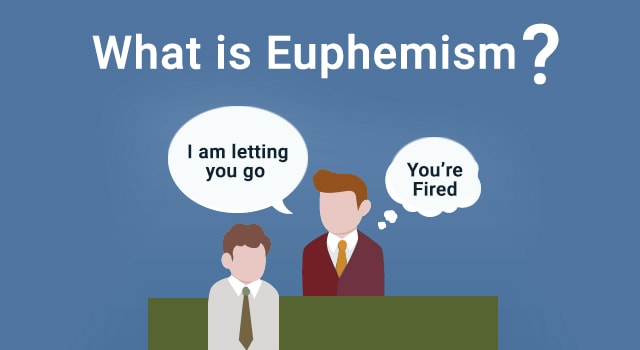Euphemism
A euphemism is a word or a phrase which when replaced by another word, removes the statement’s potential to hurt feelings or cause embarrassment, and instead replaces it with a word which gives the statement a harmless or otherwise positive connotation. Euphemisms are generally employed when the subject matter involves a social taboo of one kind or another – about sex, death, bodily functions or body parts, etc.
Here’s the dictionary.com definition of euphemism:
euphemism
noun
a mild or indirect word or expression substituted for one considered to be too harsh or blunt when referring to something unpleasant or embarrassing.
“downsizing” as a euphemism for cuts”
synonyms: polite term, indirect term, circumlocution, substitute, alternative, understatement, genteelism

A quote about euphemism:
“Euphemisms persist because lying is an indispensable part of making life tolerable.” ― Bergen Evans
Why Use a Euphemism
A euphemism is employed to substitute an expression with one that is more pleasant and which is potentially offensive with an expression that is less likely to hurt feelings, causes embarrassment or offend someone.
A description of someone’s occupation or activity (usually a social taboo), may use a euphemism to conceal or make ambiguous, the reality of the identity or of the activity, such as a stripper being called an exotic dancer
Euphemisms also make for humorous materials for comedians. The comedian, George Carlin had some jokes about how phrases associated with air travel depends a lot on euphemisms, as in:
“A sudden loss in cabin pressure.” – Roof flies off!
“Water landing.” – Crashing into the ocean!
“Change in equipment.” – Broken plane!
People, especially politicians, also use euphemisms to disguise their not so honorable motives. For example, the phrase ‘collateral damage’ sounds better than a military attack in which it is known that civilians will be the primary victims.
The use of the euphemism is to make us feel better in the face of unpleasant realities. We use them all the time, such as ‘pass on’ or ‘gone to a better place’ meaning ‘to die’, ‘using the bathroom’, ‘sleep together’, etc.



















